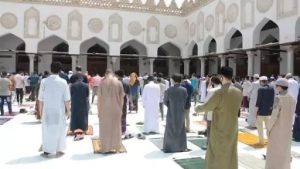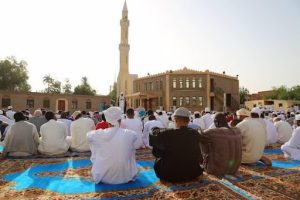Eid al-Fitr and Eid al-Adha are two of the most important festivals celebrated by Muslims worldwide. These festivals mark the end of Ramadan and the Hajj pilgrimage, respectively.
On these occasions, Muslims gather together to offer prayers and express their gratitude to Allah S.W.T. for His blessings. One of the important aspects of these celebrations is the recitation of Eid Takbeers which we will discuss in this article.
What is Eid Takbeers?
Eid Takbeers are a series of phrases that are recited by Muslims during the days leading up to Eid al-Fitr and on the day itself.
They are a way of expressing gratitude to Allah S.W.T for the blessings of the holy month of Ramadan and for the opportunity to celebrate Eid with family and friends.
also, they are typically recited in a loud voice, either individually or as a group, and are an important part of the Eid al-Fitr celebrations.
Usually, the Takbeers of Eid al-Fitr begin on the eve of the festival, after the final sunset prayer of the holy month of Ramadan where Muslims will recite the Takbeers on their way to the masjid for the special Eid prayer that is performed on the morning of Eid al-Fitr.
The Takbeers continue throughout the day, as Muslims celebrate with family and friends by exchanging greetings and gifts after offering prayers of thanks to Allah S.W.T.
So the sentiment behind the Takbeers remains the same to show gratitude to Allah for His blessings and to glorify Him on this special occasion.
Number of Eid Takbeers in Eid prayer

The number of Eid Takbeers in the Eid prayer depends on the specific Islamic school of thought or Madhhab Being followed
- In the Hanafi school of thought:
There are six Takbeers in the Eid prayer: three at the beginning of the first Rak’ah and three at the beginning of the second Rak’ah. - In Shafi’i and Maliki schools of thought:
There are also six Takbeers in the Eid prayer: three at the beginning of the first Rak’ah and three at the beginning of the second Rak’ah. - In the Hanbali school of thought:
There are seven Takbeers in the Eid prayer: five at the beginning of the first Rak’ah and two at the beginning of the second Rak’ah.
In any case, the Imam leading the Eid prayer will say the Eid Takbeers out loud and the congregation will follow by saying “Allahu Akbar” after each Takbeer.
Significance of the Takbeers of Eid al-Fitr
Eid al-Fitr is celebrated on the first day of Shawwal, the month following Ramadan. This day is significant because it marks the end of the month-long fasting period of Ramadan.
On this occasion, Muslims gather in mosques and open spaces to perform the Eid prayer, which consists of two rakats (units of prayer) and includes additional Takbeers, recitations, and supplications.
The Takbeers themselves consist of a series of phrases that glorify Allah and express gratitude for his blessings.
The most common Takbeer is “Allahu Akbar”, which means “Allah is the greatest”. This phrase is repeated several times throughout the Takbeers, along with other phrases such as “La ilaha illa Allah”, which means “There is no god but Allah”. Eid Takbeers are recited in Arabic, the language of the Quran, and are an important part of the Islamic tradition.
The recitation of Takbeers is not only a way of expressing gratitude and celebrating the end of Ramadan, but it is also a way of strengthening the Muslim community. By reciting Takbeers together, Muslims feel a sense of unity and togetherness, and they are reminded of the importance of their faith and their connection to Allah.
Overall, the Eid Takbeers is a way for Muslims to express their faith and gratitude on the occasion of Eid and to join together in celebrating the blessings and mercy of Allah.
Eid Takbeers translation

Eid Takbeers are recited before the Eid prayer and continue until the Imam begins the prayer.
So Here is the full version of the Eid Takbeers with their translations:
1. Allahu Akbar, Allahu Akbar, Allahu Akbar, La ilaha illallah, Allahu Akbar, Allahu Akbar, Allahu Akbar, Wa lillahi al-hamd.
Translation: “God is the greatest, God is the greatest, God is the greatest. There is no god but Allah. God is the greatest, God is the greatest, God is the greatest. All praise is due to Allah.”
This phrase has been repeated a total of 11 times. The Takbeers of Eid al-Fitr are also recited after the prayer, but the number of repetitions may vary.
2. Subhanallah, wal alhamdulillah, wa la ilaha illallah, wa Allahu Akbar.
Translation: “Glory be to Allah, and all praise is due to Allah. There is no god but Allah, and God is the greatest.”
3. La ilaha illallah, wahdahu la sharika lah, lahul mulku wa lahul hamdu, wa huwa ‘ala kulli shay’in qadir.
Translation: “There is no god but Allah, He is One and has no partner. To Him belongs the dominion, and to Him belongs all praise. And He can do all things.”
4. Allahu Akbar, Allahu Akbar, la ilaha illallah, wallahu Akbar, Allahu Akbar, wa lillahi al-hamd.
Translation: “God is the greatest, God is the greatest, there is no god but Allah, and God is the greatest. God is the greatest, and all praise is due to Allah.”
5. La ilaha illallah, Allahu Akbar, wa lillahi al-hamd.
Translation: “There is no god but Allah, God is the greatest, and all praise is due to Allah.”
These Takbeers are usually recited during Eid al-Fitr and Eid al-Adha, the two major Islamic holidays. They are a way to express joy, gratitude, and devotion to Allah.
In conclusion, the recitation of Eid Takbeers is an important aspect of Eid al-Fitr celebrations for Muslims around the world. They are a way of expressing gratitude to Allah for the blessings of Ramadan and for the opportunity to celebrate Eid with family and friends. The Takbeers serve to strengthen the Muslim community and are a reminder of the importance of faith and unity.









